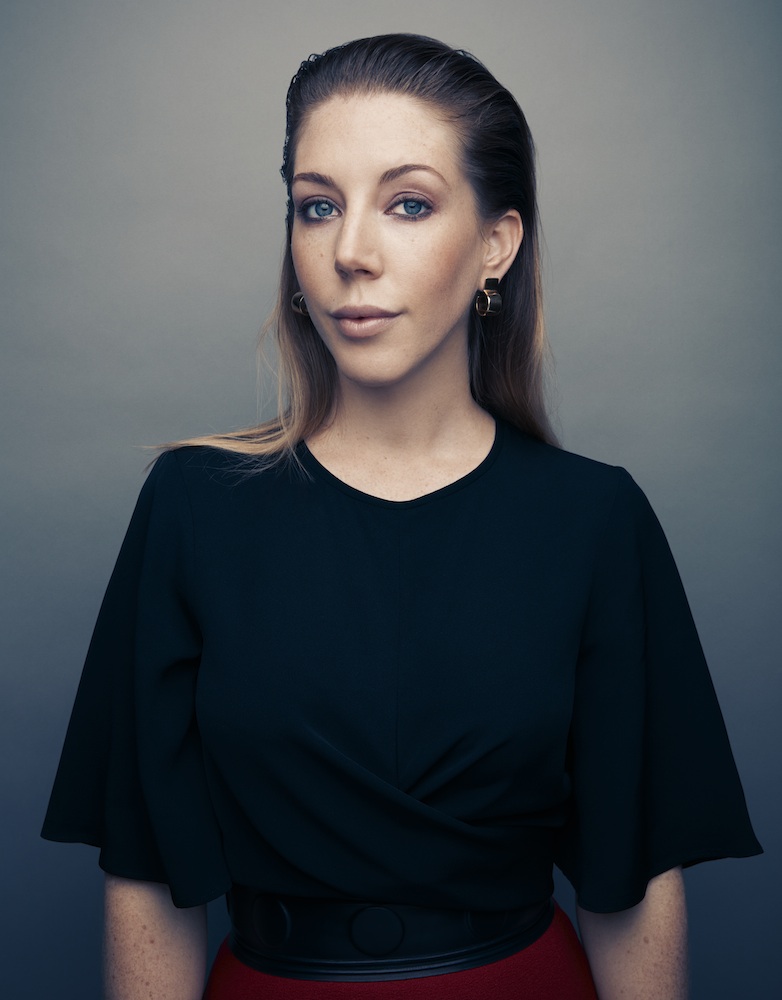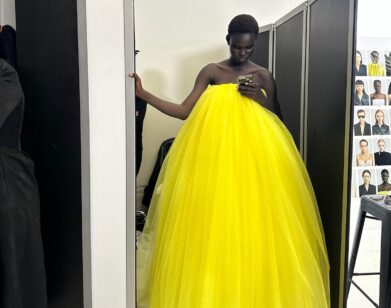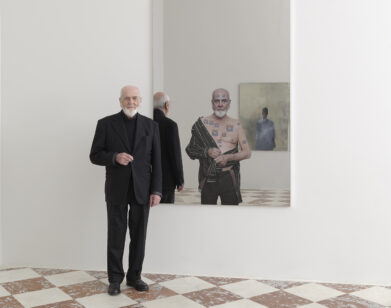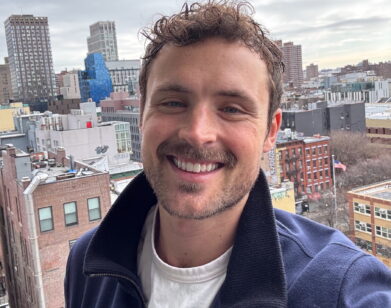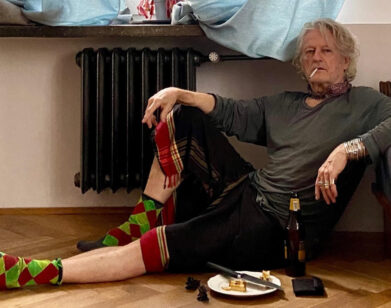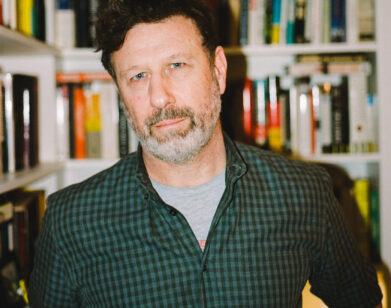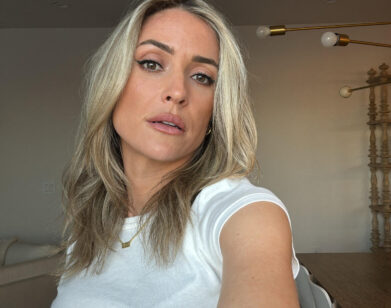The Comedian
KATHERINE RYAN IN LONDON, NOVEMBER 2016. PHOTOS: MATT HOLYOAK/KAYTE ELLIS AGENCY. STYLNG: ALEX PETSETAKIS. HAIR: MAKI TANAKA USING BUMBLE AND BUMBLE. MAKI TANAKA MAKEUP: AKGUN MANISALI FOR CHANEL/THE LONDON STYLE AGENCY . PHOTO ASSISTANT: LUKE WELLER. STYLING ASSISTANT: JOANNA GYAMERA. RETOUCHING: THE SHOEMAKER’S ELVES LONDON.
During her comedy shows, Katherine Ryan will sometimes bring up zeitgeist-y celebrities. She has, for example, a particularly amusing bit about U.K. TV personality Cheryl Fernandez-Versini, formerly Cheryl Cole. “I’m the nation’s sweetheart,” she says, imitating Cole’s Geordie accent. “No, you’re the answer to the question, ‘How beautiful do you have to be to make the nation forget about how your racist assault charge?'”
“I do meet people from my act from time to time,” Ryan tells us over the phone from London. “They give me a little flicker of worry—‘Have I been unfair?’ But I’m usually talking about a greater narrative or a scene. I’m not just destroying them personally,” she continues. “The Cheryl Cole bit isn’t about Cheryl Cole so much as our tendency as a celebrity-consuming culture to put people on a pedestal just for what they look like. It’s about us and how quickly we shift in terms of approval or disapproval.”
Born and raised in Ontario, Canada, Ryan has spent the last eight years living in London. It is on the U.K. comedy circuit—from the Edinburgh Fringe Festival to panel shows like Mock the Week, Never Mind the Buzzcocks, and Have I Got News For You—that Ryan honed her tone. Though she is still on the rise in North America, she is already very famous in her adopted country. “Really, I’m a British comic,” she explains. “I’ve developed out here, all my career has been in England.” The hardest place for her to perform, she continues, is Canada. “That’s where I have to reposition myself … I’m Canadian, but they’ve never seen me before because I don’t live there.”
EMMA BROWN: When did you realize that other people found you funny?
KATHERINE RYAN: I think I was aware earlier that people didn’t find me funny, which is just as important and empowering. There’s always going to be both groups—you can’t please everyone, and that’s fine. I think I found it fascinating that people at school—other kids—didn’t think I was funny. I was certainly not a class clown; I confused and angered a lot of people with my sense of humor. Not to say that it was sophisticated or anything, but it was more sophisticated than a six-year-old’s toilet humor. I really loved making my mom laugh, and I knew that she thought that I was funny. It was really valuable in my home growing up to be able to have a chat and participate in a conversation and be funny. Whatever I could do to make my mom laugh could either get me out of trouble, or just get me more attention, or get me respect in the house. So that was the only place that I was funny: in the house.
BROWN: How did you start doing stand-up?
RYAN: I started doing little amateur nights at the comedy club that was right next to the restaurant that I waitressed in when I was in university. I was probably 22 years old. I didn’t do it with any intention of making a career out of it; I had just always valued comedy. I kind of did it the way that you do at the Soulcycle class: I thought, “Oh, this will be this fun, amateur night every Tuesday.” I went on for five minutes, and I didn’t tell anybody I was doing it. Gradually I got better, and then slowly I started getting more and more paid gigs. It became a career by accident.
BROWN: Do you remember what your material was when you started doing your first five minutes?
RYAN: I do. I remember speaking about my flatmate at the time and the type of friendship that we had. I remember talking about my family, talking about my mother giving me a rape whistle. I talked about tickets to Dr. Phil—my mom gave me tickets to see Dr. Phil‘s taping live in Toronto. I talked about how, “You know your life is messed up when your mother gives you tickets to see Dr. Phil.” I was fascinated by the audience that he had and the fact that his producers put pretty young women up front so that they would be in shots, and the women there just treated him like a rock star. It was mostly about that. I tried to be edgy when I was starting out because those are the type of comedians that I liked, but I didn’t really understand what it took to be edgy. I had some things about race, but really in retrospect they were not sophisticated enough to be poignant; they were probably just offensive.
BROWN: When did you last die on stage?
RYAN: I do corporate gigs when I can now, and those will be end of the year awards for a company or just some gala. I wouldn’t say that I die on those, but I don’t die on tour, because those are people who bought a ticket and have come to see you on purpose. That’s the luxury and the privilege of being a comedian who tours, because coming in you already have a really good shot of it going well. But for the corporates, they’re a little bit more surprised to see you, some of them will have never heard of you before. And they’re really dressed up; I think people find it harder to laugh when they’re really dressed up. So I’ve died a bit on a couple of those. They just want to get their awards and want you to stop talking. The most notable time that I died was probably five years ago, and I didn’t get heckled or anything—I don’t mind getting heckled, I think you can work from that and come back from it. This was more that every person in the room just turned their backs and started having their own conversations. It was like I was a mad woman in the room with a microphone talking into it for no reason. No one was listening; it was really bad. I was newer then—I was just a five-year comic. I thought that if I didn’t complete my 20 minute stage time that I wouldn’t get paid, and at that time I still really needed to get paid, so I carried on for 20 minutes of them just completely ignoring and talking over me. If that happened again, I would just leave. I’d be like, “Alright. You win.” But I died pretty bad that night. That was when I was still doing club gigs. I still do club gigs now for new material, but I wasn’t doing my own tours. I was just one of four comics on a mixed bill for a Christmas gig at a club.
BROWN: When you’re writing a show and work your new material in clubs, how important is the audience reaction in terms of what stays in the show?
RYAN: I think you have to find a balance. Usually now, I can tell if my audience is going to think something’s funny or not. But then there are a few stories and a few jokes that I love, and they never really get a good reaction, but I keep them in just because I love them. You wouldn’t be able to have a whole show like that, but there are comedians that pander to the audience as well and that can be pretty lazy. They do, maybe, this simple joke that gets a laugh, and this joke might be misogynist, or they might be punching down rather than punching up. It’s tempting just to do the thing to make the audience laugh in a club setting, and you don’t want to do that either. It’s been said about James Franco that he makes some films that are going to sell very well, and then he makes a few indie films for himself, and then he’ll make a few films that sell really well, then a few for himself. I think you have to treat jokes the same way. Fun for you, fun for me, fun for you, fun for me—and hopefully, the bulk of them are for everyone.
BROWN: How malleable is your show once you’re on tour? Do you skip bits or improvise or feed off the audience? How does that work?
RYAN: It’s really good to be interactive. With so many streaming services and so much stand-up comedy on television as well, there’s nothing that emulates a live experience perfectly. If you didn’t have things happening on the night and in the moment that involved the audience, then there wouldn’t really be that much incentive to go out and support live comedy. You do have to be really flexible and malleable, and talk to the audience to see what they’re going for and what they’re not. And change the order of things, maybe. I do a lot of topical stuff as well, and you just can’t get away with doing that for eight months on tour because the world is changing so quickly—people forget about stories, new stories come on. I do change it quite a bit during the tour, actually.
BROWN: Does it make you sad that there’s one night that they film it, and that’s how it’ll be remembered?
RYAN: Yeah, actually. I do get a little bit of anxiety about that. Some comics do two shows, so they’ll film the Friday and the Saturday in the same outfit and then they cut it together, and that’ll be the special. I think that’s smart. I know Chris Rock, for his special, had it all over the world, so it’d be like “London! New York! Goodnight Abu Dhabi!” The thing about stand-up comedy is that as soon as you say something, it almost feels like it disappears, but once it’s recorded forever, then it’s different. It gives you such impetus to write a new show, because you always have to have new material. It can be very liberating actually to film it, get it in the can, then go out and write again, go back to the clubs and practice your material.
BROWN: Are you always writing?
RYAN: I just open up the notes app in my phone and I’ll make little notes about things that I want to go back to later and see if I can make something of. Right now, for example, are you into Kardashians at all?
BROWN: No, but I am very aware of them.
RYAN: [laughs] Okay, you’re one of those people. Everyone’s aware of them, and you either love them or you hate them. Khloe has a show called out called Revenge Body, and she looks incredible. She’s been in the gym a lot following her heartbreak and her split from her husband who has some dependency issues. She dealt with it in a really healthy way; instead of it imploding, she got a lot of exercise and made herself feel better. I just think there’s something in that for me: this theme of when men get revenge, Liam Neeson will ring you up and say he’ll come and destroy you, or in Machete, they’ll climb the building using their intestines as a rope. When women get revenge, what do we do? What’s a revenge body? We just shrink? What kind of revenge is that? I think there’s something really funny in that. I like to combine a few different things: I like to talk about culture, but not so that I can be gossipy about the Kardashians; it’s because it always flags up a greater theme for me, an important social observation, and then I see if I can make it make it funny and have a laugh.
BROWN: Do you feel that, as a comedian, you have a social responsibility to talk about these things? Can you be an apolitical comedian?
RYAN: I think you could be, and I know many comedians who don’t talk politics at all. I applaud them for that; I think it’s a really smart way to be. A lot of people want escapism when they go to see comedy—they don’t want to hear about important issues. I’m not really the kind of comedian that can do that. I try not to focus on it too much—I would never be described as a hugely political woman—but the fact of the matter is, just me being a female, immigrant, stand-up comedian, single-mother … that is political. We still live in a world where a woman with a voice is a political gesture. I’m dealt with differently than male comedians are dealt with by people on Twitter and probably a lot of the media. We’ve not completely escaped from that. I do feel like I have a responsibility to use my privilege, to be an advocate and to talk about my own experience—to be political. That’s not to say that everyone should be.
BROWN: I was reading some of your interviews, and you talked about how, at first, you didn’t understand why people kept asking you what it’s like being a female comedian, because you grew up thinking that you could be anything and everything. Was there a point where you realized that, “Maybe I was raised this way, but it’s not as simple as that”?
RYAN: Yeah. I was really lucky to have been raised in this really powerful matriarchy where my dad was around but I was with my mom and my grandma most of the time. They were heavy influences on me. My mother has a career in technology; my grandma sold real estate. I watched them around the house and being really smart. I only had sisters, so I didn’t have boys around to compare us to. I just took it for granted that we had every opportunity available to us. I didn’t even consider that I might be treated a different way as a woman. I didn’t know about the gender wage gap, about what women in different cultures still experience today in terms of abuse and discrimination and a lack of a right to education. I didn’t know about those things because I grew up in this really sheltered environment in a small Canadian house. Of course, as soon as I moved into a big city, as soon as I traveled a little bit and got older, I learned about the world and had a greater sense of the injustices that go on, not just for women, but for minorities. I’m really lucky, because I had the best of both worlds. I had this ignorance, really, about the barriers that I might face, so I just did the things that I wanted to do because I wanted to do them. I didn’t really have any fear of failure related to that. I think if you do have it, it can become hypnotic. Every time a journalist will say: “Can women be funny? Can women be pilots? Can women be scientists?” It’s less of a question and more of a statement after a while that makes you believe that maybe we can’t. I think that’s dangerous. I was really happy that I didn’t have those barriers, but now I recognize the barriers of many other people. That’s again where I feel a responsibility for advocacy.
BROWN: Growing up, did you get along with your sisters?
RYAN: I did. I make fun of my middle sister quite a bit in my latest special. She really gets it from me, but that’s always been our relationship—I got along really well with my baby sister and I just completely clashed with my middle sister. It’s kind of a benevolent hatred that we have for one another. I love her very much, but we’re just such different people; she’s a super vanilla, lovely teacher. She’s religious. She’s the type of personality that’s really sensitive, and I grew up with the type of personality where I loved caustic humor, almost insult comedy. When it happened to me I never took it personally, I always thought that it was funny. I didn’t understand why she was so sensitive about any type of teasing, and unfortunately it only made me do it more. We’ve had a tumultuous relationship, but we are very close.
BROWN: Do people in your life ever ask you not to talk about them onstage? Is that a difficult line to navigate?
RYAN: The people that I’m close to in my life know that I will talk about them in my show, probably. But I always disguise and protect people by changing names and places. If something happened to my sister, I might say that it happened to my cousin, or my auntie, or my friend’s sister. The analogy that I use is that I think politicians tell a whole bunch of little lies, so you can’t really pin them down on any because the words that they’re saying are true, but there’s a greater lie. I think comedians tell little lies to construct a greater truth. I talk about experiences and I tell the truth, but I change things around to protect the people. [But] I’ll meet someone for five minutes, like a taxi driver or someone in a shop, and it’s always those people that are like, “Oh, don’t do stand-up comedy about me!” and I’m like “What? I’ve known you for three minutes, I won’t.”
FOR MORE ON KATHERINE RYAN, VISIT HER WEBSITE.
For more from our “Faces of 2017” portfolio, click here.

